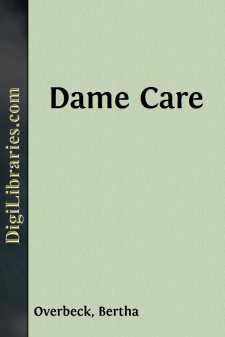Categories
- Antiques & Collectibles 13
- Architecture 36
- Art 48
- Bibles 22
- Biography & Autobiography 813
- Body, Mind & Spirit 142
- Business & Economics 28
- Children's Books 14
- Children's Fiction 11
- Computers 4
- Cooking 94
- Crafts & Hobbies 4
- Drama 346
- Education 46
- Family & Relationships 57
- Fiction 11829
- Games 19
- Gardening 17
- Health & Fitness 34
- History 1377
- House & Home 1
- Humor 147
- Juvenile Fiction 1873
- Juvenile Nonfiction 202
- Language Arts & Disciplines 88
- Law 16
- Literary Collections 686
- Literary Criticism 179
- Mathematics 13
- Medical 41
- Music 40
- Nature 179
- Non-Classifiable 1768
- Performing Arts 7
- Periodicals 1453
- Philosophy 64
- Photography 2
- Poetry 896
- Political Science 203
- Psychology 42
- Reference 154
- Religion 513
- Science 126
- Self-Help 84
- Social Science 81
- Sports & Recreation 34
- Study Aids 3
- Technology & Engineering 59
- Transportation 23
- Travel 463
- True Crime 29
Dame Care
by: Bertha Overbeck
Description:
Excerpt
CHAPTER I.
Just when Meyerhofer's estate was to be sold by auction, his third son Paul was born.
That was a hard time indeed.
Frau Elsbeth, with her haggard face and melancholy smile, lay in her big four-post bed, with the cradle of the new-born child near her, and listened to every noise that reached her in her sad sickroom from the yard and the house.
At each suspicious sound she started up, and each time, when a strange man's voice was heard, or a vehicle came driving along with a rolling sound, she asked, clinging with great anxiety to the bedposts:
"Has it come to the worst? Has it come to the worst?"
Nobody answered her. The doctor had given strict orders to keep every excitement from her, but little he thought, good man, that this constant suspense would torment her a thousand times more than the most terrible certainty.
One morning, the fifth day after her child's birth, she heard her husband, whom she had scarcely seen during this trying time, pacing up and down in the next room, swearing and sighing. She could only understand one word, only one; that he repeated over and over again: the word "Homeless."
Then she knew. It had come to the worst.
She put her feeble hand on the little head of the new-born child, who with his little serious face was quietly dozing, hid her face in her pillow and wept.
After a while she said to the servant who attended the little one,
"Tell your master I want to speak to him."
And he came. With loud steps he approached the bed of the sick woman, and looked at her with a face that seemed doubly distorted and desperate in his endeavor to look unconcerned.
"Max," she said, timidly, for she always feared him—"Max, don't hide anything from me; I am prepared for the worst, anyhow."
"Are you?" he asked, distrustfully, for he remembered the doctor's warning.
"When have we to go?"
As he saw that she took their misfortune so calmly, he thought it no longer necessary to be careful, and broke out, with an oath:
"To-day—to-morrow—just as it pleases the new owner. By his charity only we are still here, and, if it pleased him, we might have to lodge in the streets this very night."
"It won't be as bad as that, Max," she said, painfully striving to keep her composure, "if he hears that, only a few days ago, a little one arrived—"
"Oh, I suppose I shall have to beg of him—shall I?"
"Oh no; he will do it without that. Who is it?"
"Douglas, he is called. He comes from Insterburg. He seemed to swagger very much, this gentleman—very much. I should have liked to have driven him from the premises."
"Is anything left us?" she asked, softly, looking hesitatingly down on the new-born child, for his young, tender life might be depending on the answer.
He broke out into a hard laugh. "Yes; a wretched pittance: full two thousand thalers."
She sighed with relief, for she almost felt as if she had already heard that terrible "Nothing" hissed from his lips.
"What good are two thousand thalers to us?" he continued, "after we have thrown fifty thousand into the swamp?...


